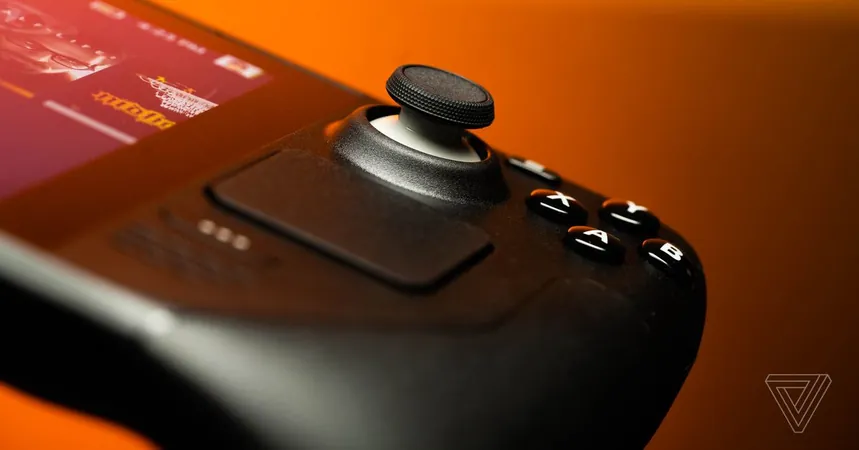
Valve’s Bold Vision for a Gaming Revolution: Could SteamOS Machines Conquer the Living Room?
2024-12-06
Author: Kai
Introduction
Valve is taking bold strides that could potentially disrupt the dominance of the Sony PlayStation and Microsoft Xbox, alongside challenging the Meta Quest's reign as the top VR headset. The tech giant is seemingly gearing up to unveil an array of new hardware powered by SteamOS that could change the gaming landscape dramatically.
Upcoming Hardware
Recent leaks suggest that Valve is developing a wireless VR headset codenamed “Deckard,” trackable controllers known as “Roy,” and a gamepad dubbed “Ibex.” What's more, a new living room console, referred to as “Fremont,” is also on the horizon. Even third-party hardware partners are set to join the fray, promoting an expansive ecosystem of SteamOS devices.
Competitive Landscape
While taking on gaming behemoths like Sony, Microsoft, and Meta presents challenges, Valve is leveraging insights gathered from the popularity of the Steam Deck. This success has exposed weaknesses in the competition—most notably, the increasing gamer demand for flexibility in playing a vast library of games anywhere, anytime.
Ecosystem of SteamOS Devices
As these companies scramble to adapt, Valve is positioning itself as a potential pioneer in an emerging ecosystem where manufacturers can tap into an extensive library of Windows games without relying on Microsoft’s sometimes cumbersome operating system. Traditionally, gaming PCs have struggled to combine portability with speed and ease of use. Handheld devices have often suffered from a lack of optimization, leaving gamers frustrated.
Changing the Narrative
Valve plans to change this narrative. With its recent commitments to external support for rival handheld devices like the Asus ROG Ally and an updated strategy document hinting at a more aggressive push, Valve is determined to ensure that SteamOS devices are not just an afterthought. They are extending a helping hand to third-party manufactures, encouraging the creation of “Powered by SteamOS” classification, signifying hardware built in close collaboration with Valve.
Steam Compatible Devices
Moreover, companies will have the green light to design 'Steam Compatible' devices that come with Valve-approved controllers and SteamVR hardware, facilitating game streaming across platforms. Recent reports indicate that the upcoming Steam Controller 2 could incorporate technology that allows for accurate tracking in virtual environments, whereas the VR controllers may double as gamepads, providing access to Steam's large library of conventional games.
Exploring New Technologies
In a significant pivot, Valve is reportedly investigating Arm chips, which could enhance battery life and reduce weight in portable VR headsets compared to traditional AMD x86 options. This innovation could bring unprecedented capabilities to their upcoming products while potentially introducing a new generation of gaming consoles equipped with enhanced hardware.
Learning from the Past
Reflecting on its earlier efforts with Steam Machines, it's clear that Valve is evolving from its initial misstep. The past had its share of challenges, with Valve struggling to convince developers to port games to Linux and creating a controller that didn’t resonate with users. However, their dedication and perseverance led to the formation of Proton—a remarkable software layer that allows many Windows games to run more efficiently on Linux.
Potential Gaming Revolution
If manufacturers can harness the power of Steam Machines rather than sticking to conventional Windows machines, they might produce superior gaming hardware. There’s also the tantalizing possibility of future VR headsets that are not tethered to major corporations like Microsoft or Meta, allowing for greater creative freedom and ultimately, better gaming experiences.
Conclusion
Despite uncertainties about how this vision will manifest, there’s a renewed sense of excitement around Valve's strategy. Industry executives remain cautious, expressing concerns about Valve's capacity to provide ongoing support. Yet, as they embark on this new journey, it's undeniable that they have the potential to reshape the gaming environment into something extraordinary—one that truly celebrates the gamer’s freedom.
Could Valve's gambit be the game-changer we've all been waiting for? Stay tuned as we monitor this evolving story that may lead to a gaming revolution in our living rooms!

 Brasil (PT)
Brasil (PT)
 Canada (EN)
Canada (EN)
 Chile (ES)
Chile (ES)
 Česko (CS)
Česko (CS)
 대한민국 (KO)
대한민국 (KO)
 España (ES)
España (ES)
 France (FR)
France (FR)
 Hong Kong (EN)
Hong Kong (EN)
 Italia (IT)
Italia (IT)
 日本 (JA)
日本 (JA)
 Magyarország (HU)
Magyarország (HU)
 Norge (NO)
Norge (NO)
 Polska (PL)
Polska (PL)
 Schweiz (DE)
Schweiz (DE)
 Singapore (EN)
Singapore (EN)
 Sverige (SV)
Sverige (SV)
 Suomi (FI)
Suomi (FI)
 Türkiye (TR)
Türkiye (TR)
 الإمارات العربية المتحدة (AR)
الإمارات العربية المتحدة (AR)